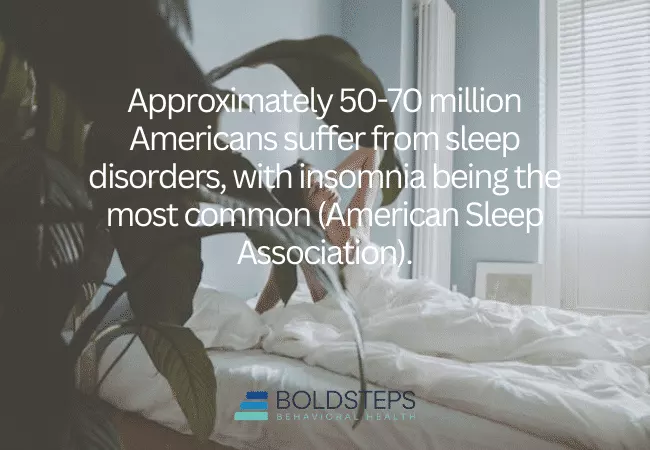Sleep is a vital component of overall health, influencing everything from emotional stability to physical recovery. Yet, millions of people struggle to achieve quality sleep, often due to underlying mental health conditions such as Anxiety, Depression, or Obsessive Compulsive Disorder (OCD). Poor sleeping habits not only exacerbate these challenges but also make recovery from Psychological Trauma and co-occurring conditions more difficult.
This guide explores the intricate connection between sleep and mental health, practical strategies for improving sleep, and how professional treatment options, such as Mental Health Treatment, Partial Hospitalization Programs (PHPs), and Intensive Outpatient Programs (IOPs), can help you regain restful nights.
Why Sleep Matters for Mental Health and Recovery
Quality sleep is more than rest—it’s a fundamental aspect of your overall well-being. Here’s why:
1. Emotional Regulation
- Sleep helps regulate emotions and manage stress. Sleep deprivation can heighten irritability, reduce emotional resilience, and increase susceptibility to anxiety or depressive episodes.
2. Cognitive Function
- Sleep supports memory consolidation, decision-making, and problem-solving skills. Without adequate rest, focus and productivity diminish, leading to frustration and poor mental performance.
3. Trauma Recovery
- Sleep plays a crucial role in processing and recovering from Psychological Trauma. REM sleep helps the brain process distressing memories, which is essential for emotional healing.
4. Physical Health
- Chronic sleep deprivation is linked to increased risks of heart disease, weakened immunity, and metabolic disorders. Physical health impacts mental health, creating a cycle of deterioration if sleep is not prioritized.
How Mental Health Impacts Sleep
The relationship between mental health and sleep is bidirectional—poor sleep can worsen mental health conditions, and mental health challenges can disrupt sleep.
1. Anxiety Disorders and Insomnia
- How It Affects Sleep: Constant worry and racing thoughts make it difficult to relax, fall asleep, or stay asleep.
- Symptoms: Prolonged periods of sleeplessness, restless nights, or waking up frequently.
- Solution: Anxiety Disorder Treatment often includes therapy and mindfulness techniques to calm the mind.
2. Depression and Sleep Disturbances
- How It Affects Sleep: Depression disrupts the sleep-wake cycle, leading to insomnia or hypersomnia (excessive sleeping).
- Symptoms: Feeling tired despite sleeping for extended hours or struggling to fall asleep.
- Solution: Depression Treatment with therapy and medication can restore balance to sleep patterns.
3. Obsessive Compulsive Disorder (OCD)
- How It Affects Sleep: Intrusive thoughts and compulsive behaviors can delay bedtime or interrupt sleep cycles.
- Symptoms: Lying awake obsessing over worries or engaging in nighttime rituals.
- Solution: Therapy tailored to OCD, such as Exposure and Response Prevention (ERP), can reduce symptoms.
4. Dual Diagnosis Challenges
- How It Affects Sleep: Co-occurring mental health and substance use disorders compound sleep disturbances through withdrawal symptoms, cravings, or emotional instability.
- Symptoms: Difficulty falling asleep, vivid nightmares, or irregular sleep patterns.
- Solution: Integrated Dual Diagnosis treatment addresses both the substance use disorder and mental health condition, paving the way for restful sleep.
The Link Between Sleep and Recovery
Sleep is more than a biological necessity—it is a cornerstone of physical, emotional, and mental recovery. Whether you’re healing from mental health conditions, recovering from substance use, or managing co-occurring disorders, quality sleep plays a critical role in ensuring successful and sustained recovery. Understanding the intricate relationship between sleep and recovery helps highlight why prioritizing rest is vital during the healing process.
1. Sleep Enhances Emotional Regulation
One of the most profound benefits of sleep is its ability to stabilize emotions. During the REM (Rapid Eye Movement) stage of sleep, the brain processes and organizes emotions, reducing the intensity of negative experiences.
How Sleep Affects Emotional Recovery:
- Improved Stress Management: Sleep reduces cortisol (the stress hormone) levels, helping individuals respond to challenges more calmly.
- Decreased Irritability: Lack of sleep heightens emotional reactivity, making it harder to cope with everyday stressors.
- Trauma Healing: For those recovering from Psychological Trauma, sleep allows the brain to process distressing memories in a safe, unconscious state, paving the way for emotional healing.
2. Restful Sleep Supports Mental Health Recovery
Poor sleep exacerbates mental health conditions like Anxiety, Depression, and Obsessive Compulsive Disorder. Conversely, quality sleep can amplify the benefits of therapy and treatment, creating a solid foundation for mental well-being.
Key Connections Between Sleep and Mental Health Recovery:
- Anxiety Management: Sleep helps regulate the amygdala, the brain’s fear and anxiety center. Poor sleep can over-activate the amygdala, leading to heightened anxiety.
- Depression Relief: Disrupted sleep patterns are a hallmark of depression. Addressing sleep issues alongside Depression Treatment helps break the cycle of fatigue and low mood.
- OCD Symptom Reduction: Quality sleep improves cognitive flexibility, making it easier for individuals with OCD to manage intrusive thoughts and compulsions.
3. Sleep Promotes Physical Healing
Recovery is not limited to mental health—it also involves the body. Sleep is the body’s time for repair and restoration, and without it, physical healing is compromised.
Physical Benefits of Sleep During Recovery:
- Immune System Support: Sleep boosts immune function, helping the body fend off illnesses and infections, which can be particularly important for individuals recovering from substance use or stress-related health issues.
- Tissue Repair: During deep sleep, the body produces growth hormones that repair muscles, tissues, and cells damaged by stress or physical strain.
- Detoxification: For individuals recovering from substance use, sleep facilitates the brain’s natural detoxification processes, helping to clear harmful toxins.
4. Cognitive Recovery Through Sleep
Sleep is essential for cognitive recovery, particularly in areas like focus, memory, and decision-making. Recovery often requires individuals to learn new coping mechanisms, engage in therapy, and navigate life changes—all of which are supported by adequate rest.
Cognitive Benefits of Sleep:
- Memory Consolidation: Sleep helps transfer information from short-term to long-term memory, which is crucial for absorbing therapeutic insights and learning new skills during recovery.
- Improved Focus: Rested individuals can better engage in therapy sessions, group discussions, and daily activities, maximizing the benefits of treatment.
- Enhanced Problem-Solving: Recovery often involves overcoming challenges, and sleep boosts creative thinking and problem-solving abilities.
5. Sleep and Relapse Prevention
Poor sleep is a significant risk factor for relapse in both mental health and substance use recovery. Chronic sleep deprivation increases stress levels, lowers emotional resilience, and impairs judgment, making it harder to resist triggers.
How Sleep Supports Sustained Recovery:
- Craving Reduction: Quality sleep reduces the brain’s reward-seeking behaviors, helping individuals manage cravings for substances.
- Trigger Management: Rested individuals are better equipped to recognize and avoid situations that may jeopardize their recovery.
- Relapse Awareness: Sleep improves self-awareness, helping individuals identify early warning signs of relapse.
6. Professional Support for Sleep and Recovery
If sleep disturbances persist during recovery, professional treatment programs can provide comprehensive support. Programs like Partial Hospitalization Programs, Intensive Outpatient Programs, and Outpatient Treatment Programs integrate sleep management strategies into the recovery process.
How Professional Treatment Can Help:
- Mental Health Treatment: Addresses underlying conditions like anxiety or depression that disrupt sleep.
- Cognitive Behavioral Therapy for Insomnia (CBT-I): Teaches individuals to restructure negative thoughts and habits related to sleep.
- Holistic Approaches: Mindfulness, yoga, and relaxation exercises improve sleep quality while supporting overall recovery.
- Medication Management: When necessary, sleep aids can be prescribed as part of a comprehensive care plan.
7. The Synergy Between Sleep and Holistic Recovery
Sleep, mental health, and physical recovery are deeply interconnected. Addressing one aspect often positively influences the others, creating a feedback loop that supports overall healing. For example:
- Improving sleep enhances therapy outcomes for Anxiety Disorder Treatment and Depression Treatment.
- Better emotional regulation leads to improved relationships and greater engagement in recovery programs.
Practical Strategies to Improve Sleeping Habits
1. Establish a Regular Sleep Schedule
Consistency is key to regulating your body’s internal clock.
- Go to bed and wake up at the same time every day, even on weekends.
- Avoid napping excessively during the day to maintain a healthy sleep rhythm.
2. Optimize Your Sleep Environment
Create a space conducive to rest:
- Temperature: Keep the room cool, ideally between 60-67°F.
- Lighting: Use blackout curtains or an eye mask to block light.
- Noise: Minimize disruptions with white noise machines or earplugs.
- Comfort: Invest in a supportive mattress and pillows suited to your preferences.
3. Develop a Calming Bedtime Routine
Engage in activities that signal your body it’s time to wind down:
- Read a book, practice meditation, or take a warm bath.
- Avoid screens for at least an hour before bed to reduce blue light exposure, which disrupts melatonin production.
4. Limit Stimulants and Substances
- Caffeine and Nicotine: Avoid consuming these stimulants in the afternoon or evening.
- Alcohol: While it may help you fall asleep initially, alcohol disrupts REM sleep, leading to poor sleep quality.
5. Incorporate Daily Exercise
Physical activity improves sleep quality by reducing stress and regulating energy levels:
- Aim for at least 30 minutes of moderate exercise most days.
- Avoid vigorous workouts close to bedtime, as they can be stimulating.
6. Practice Relaxation Techniques
Reduce nighttime stress with mindfulness and relaxation:
- Try progressive muscle relaxation or guided breathing exercises.
- Use apps or tools specifically designed to aid sleep.
7. Manage Stress and Mental Health
Addressing underlying emotional challenges is essential for long-term sleep improvement:
- Therapy: Speak with a mental health professional to explore stressors.
- Journaling: Write down worries before bed to clear your mind.
When to Seek Professional Help
If sleep issues persist despite lifestyle changes, it may be time to seek professional support. Sleep disturbances are often linked to underlying mental health conditions that require specialized care.
Professional Treatment Options:
- Mental Health Treatment: Addresses anxiety, depression, trauma, and other factors disrupting sleep.
- Partial Hospitalization Programs (PHPs): Offers structured care for those needing intensive daytime support while allowing them to return home in the evenings.
- Intensive Outpatient Programs (IOPs): Provides flexible therapy sessions for individuals balancing treatment with daily responsibilities.
- Outpatient Treatment Programs: Ideal for ongoing therapy and sleep management strategies.
- Dual Diagnosis Care: Combines substance use and mental health treatment to tackle co-occurring disorders impacting sleep.
Therapeutic Approaches:
- Cognitive Behavioral Therapy for Insomnia (CBT-I): Focuses on restructuring negative thoughts and behaviors related to sleep.
- Mindfulness-Based Stress Reduction (MBSR): Teaches relaxation techniques to manage stress and improve sleep quality.
- Medication Management: When necessary, prescribed medications can support better sleep alongside therapy.
Conclusion
Improving your sleep habits requires patience, consistency, and a commitment to self-care. By implementing practical strategies and addressing underlying mental health issues, you can achieve restful nights and better overall well-being.
For persistent sleep issues, consider seeking help through Mental Health Treatment. Professional care can help identify and address the root causes of your sleep disturbances, guiding you toward a healthier and more balanced life. Take the first step toward recovery and contact us at (717) 896-1880 today.
FAQ on Link Between Sleep and Recovery
Why is sleep important during recovery?
Sleep is essential for emotional regulation, cognitive recovery, and physical healing. It helps process emotions, consolidate memories, and repair the body, all of which are crucial for successful recovery.
How does poor sleep affect mental health recovery?
Poor sleep exacerbates conditions like anxiety, depression, and OCD, making recovery more challenging. It can increase stress, reduce emotional resilience, and impair focus during therapy.
Can improving sleep habits prevent relapse?
Yes, quality sleep reduces cravings, improves emotional stability, and enhances self-awareness, all of which help prevent relapse in mental health and substance use recovery.
What treatments help with sleep and recovery?
Programs like Mental Health Treatment, Partial Hospitalization Programs (PHPs), and Intensive Outpatient Programs (IOPs) often include therapies like CBT for Insomnia (CBT-I) and holistic approaches to improve sleep.
When should I seek professional help for sleep issues?
If poor sleep persists despite lifestyle changes or worsens mental health symptoms, seek professional help. Integrated treatment programs can address both sleep issues and their underlying causes.


